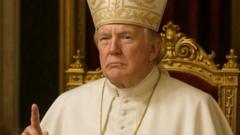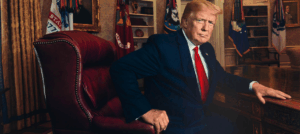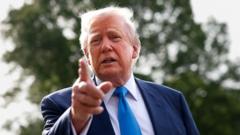As commemorations of Victory in Europe Day unfold, sentiments echo from the past, revealing a tangled web of history, alliances, and modern challenges. This year, the mood is notably somber, as voices emerge from within NATO and European capitals reflecting on the legacy of VE Day, the sacrifices made during World War II, and the modern implications of leadership styles, particularly that of US President Donald Trump.
### VE Day Reflections: Europe's Complex Relations with Trump and Russia

### VE Day Reflections: Europe's Complex Relations with Trump and Russia
In an era marked by shifting alliances, Europe commemorates VE Day, grappling with both historical triumphs and contemporary anxieties involving the US and Russia.
The remembrance of the Allied triumph over Nazi Germany comes with complexities, especially regarding the role of Russia in post-war history and current geopolitics. Many see Trump's perceived indifference towards traditional European alliances as a threat to the stability fostered since World War II. Some former diplomats express deep concern regarding the transatlantic relationships, particularly while Russia continues its aggressive posture in Ukraine.
Historical nuances surface as nations reflect on their liberation stories. For example, Czechoslovakia, which experienced a stark transition from Nazi occupation to Soviet domination, presents an ambiguous relationship with VE Day. The duality of liberation against the backdrop of communism complicates the celebratory spirit surrounding the day for many in Eastern Europe.
Furthermore, as President Putin's administration demonstrates nationalist pride through military parades and rhetoric condemning Ukraine, the specter of past invasions looms large over nations keenly aware of the fragile line between peace and conflict. Amidst these developments, a shift in European defense policy gains traction, fueled by a recognition of the need for increased independence from American military support.
Notably, the impact of Trump's foreign policy on Europe has sowed seeds of doubt among European leaders regarding their own security, sparking debates about military spending and readiness. Despite the challenges posed by such shifting dynamics, there remains an opportunity for European nations to reassess their security strategies and work towards a more autonomous defense posture.
As the world reflects on VE Day, the call for a new generation of leaders in both Europe and the US resonates, highlighting the need for cohesive efforts to navigate the uncertainties of the 21st century, while honoring the legacies of those who fought for liberty against tyranny.
Historical nuances surface as nations reflect on their liberation stories. For example, Czechoslovakia, which experienced a stark transition from Nazi occupation to Soviet domination, presents an ambiguous relationship with VE Day. The duality of liberation against the backdrop of communism complicates the celebratory spirit surrounding the day for many in Eastern Europe.
Furthermore, as President Putin's administration demonstrates nationalist pride through military parades and rhetoric condemning Ukraine, the specter of past invasions looms large over nations keenly aware of the fragile line between peace and conflict. Amidst these developments, a shift in European defense policy gains traction, fueled by a recognition of the need for increased independence from American military support.
Notably, the impact of Trump's foreign policy on Europe has sowed seeds of doubt among European leaders regarding their own security, sparking debates about military spending and readiness. Despite the challenges posed by such shifting dynamics, there remains an opportunity for European nations to reassess their security strategies and work towards a more autonomous defense posture.
As the world reflects on VE Day, the call for a new generation of leaders in both Europe and the US resonates, highlighting the need for cohesive efforts to navigate the uncertainties of the 21st century, while honoring the legacies of those who fought for liberty against tyranny.


















